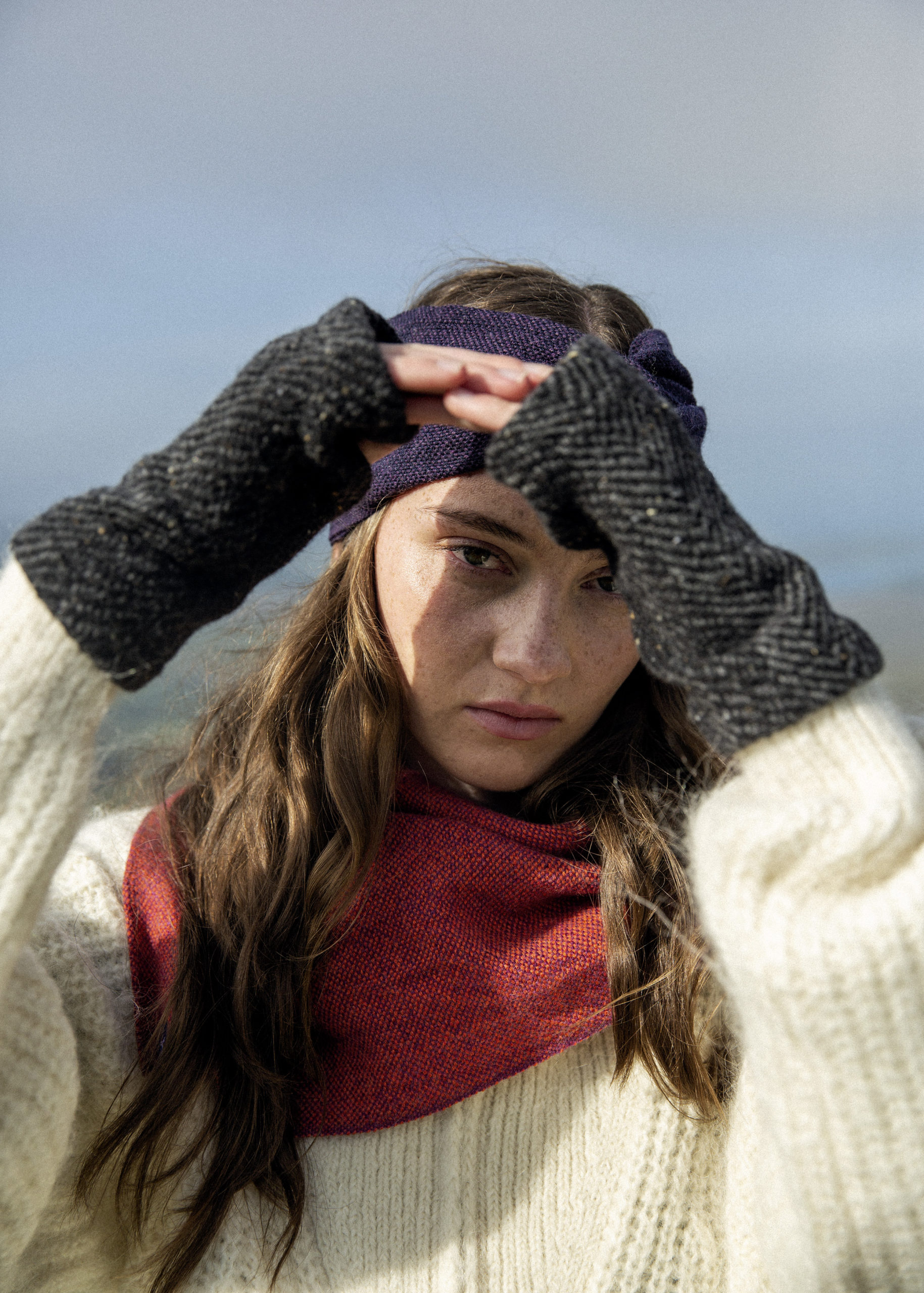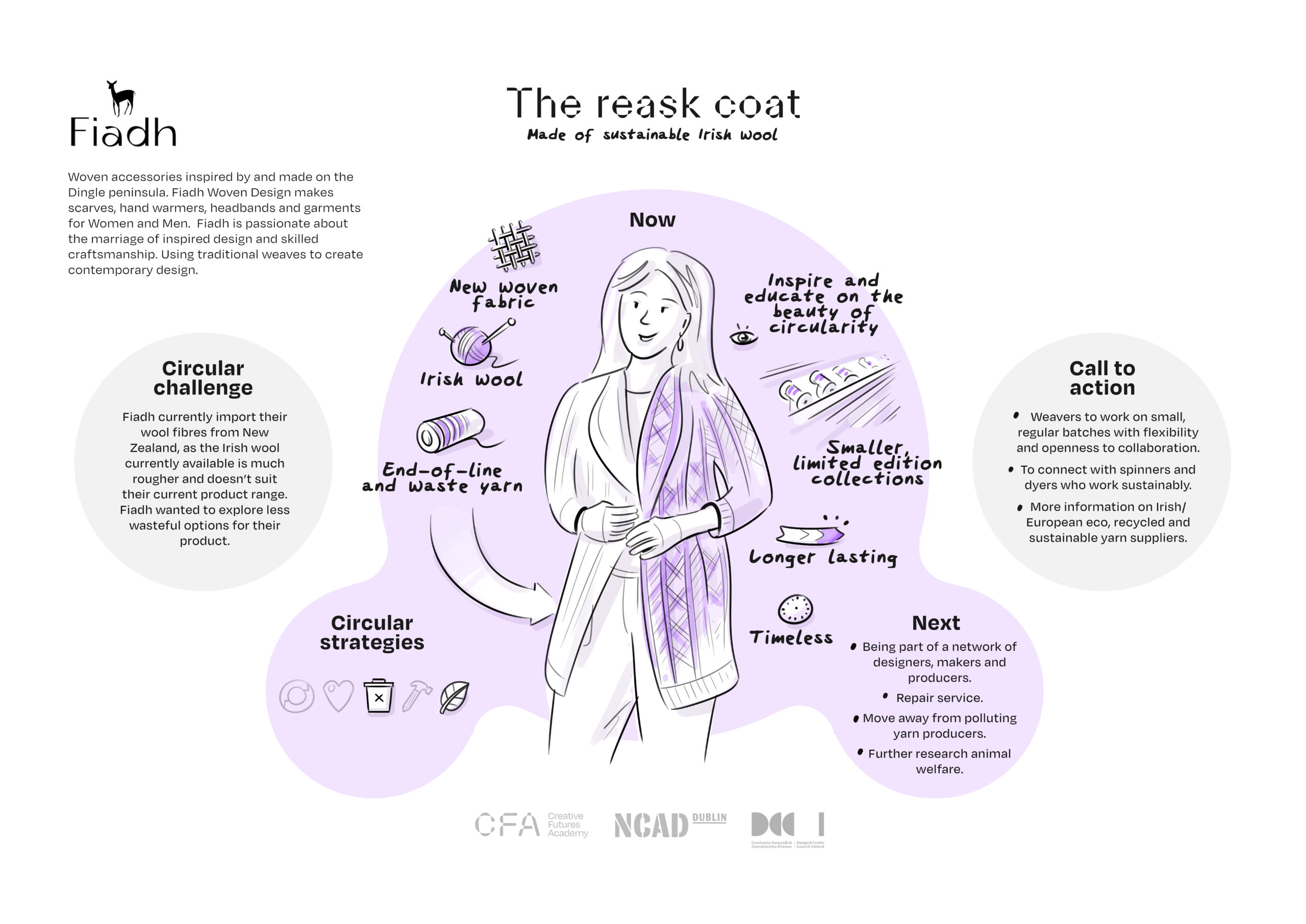Fiadh
Woven accessories inspired by & made on the Dingle peninsula. At Fiadh, they make scarves, hand warmers, headbands and garments for Women and Men. Fiadh, (pronounced fia), means deer in Irish, and relates to the ancient Irish word for ‘wild’. Founder Fiadh is a textile designer and handweaver, passionate about the marriage of inspired design and skilled craftsmanship and using traditional weaves to create contemporary design. Through the mediums of photography and weaving, Fiadh aspires to illustrate the value of timeless design, craftsmanship and connection to the land. Fiadh’s designs are informed by the intriguing colour and pattern combinations of the area.

The Reask Coat
The circular challenge
Fiadh currently import their raw material (wool fibres) from New Zealand, as the Irish wool available is much rougher and doesn’t suit their current product range. One challenge is therefore airmiles and the carbon footprint of our current raw material supply chain. A second challenge is waste from the production process, typically the end of rolls of wool. Fiadh wants to explore less wasteful options for their design process and production chain.
The circular design strategy:
- Design for Physical Durability
- Design from Safe, Renewable and Recyclable Materials
The NOW solution: What circular solution was prototyped and what are the companies short-term circular goals?
Fiadh have developed prototypes inspired by the original Aran sweater. For this coat, they have developed a new woven fabric entirely from sustainable Irish wool, end of line yarn from factories and waste yarn from their own production process.
Fiadh’s short term goals are:
- To establish more fluid processes and systems in-house that minimise waste and unnecessary consumption of raw materials.
- To inspire and educate on the beauty of circularity in design and industry through their own brand message and high quality product.
What were the main hurdles and lessons learnt from your prototyping phase?
Fiadh has struggled with the ethical question of running a for-profit business while seeing the damage of consumerism globally. However, the CbD programme has helped them to see that there are exciting ways to incorporate circularity into their work in manageable ways. They are excited to be able to make products that are multi-functional, last longer and have timeless design.
Another hurdle for Fiadh has been the fear of making changes within the business – changing suppliers, designs and processes after years of streamlining for efficiency.
However, they have discovered that this has allowed them to adapt new methods and deal with inconsistency in materials, colours and quality. For example, they have begun designing smaller, limited edition collections to facilitate working with smaller suppliers/producers. This in turn will keep things interesting for customers and for the team – a freedom they find empowering!
A technical hurdle is that the cotton in the new woven fabric they have developed for this project is beautiful, but makes the fabric much less water resistant than their previous fabrics. They hope to replace it with a fibre that is less absorbent.
The NEXT solution: What are your bigger / longer-term circular goals for your brand?
More long term goals for Fiadh include:
- To make pieces that will remind people of the value of craftsmanship, natural fibres and timeless design.
- To be part of a network of designers, makers and producers which can support each other with their shared goals. For example, establishing a network with Irish yarn producers or collaborating with other makers in developing circular products
- To provide a service for repairing to ensure longevity.
- To run weaving and textile workshops using waste and/or end of line materials to create something new. This also an opportunity to expand the circular community and awareness.
- To move away from big yarn producers that produce damaging chemical waste in the cleaning dying process, or switch to exclusively buying end of line batches of yarn from these companies.
- To further research animal welfare implications when exploring new yarn suppliers and make any necessary changes in line with their ethical standards.

Projected future impact: What is the expected positive impact - environmental, economic, social - from your longer term circular solution.
- Fiadh will continue to raise awareness of the benefits of a circular product to their growing followers on social media platforms (8,000+) repeat customers, (1000+) and newsletter subscribers (2000)
- By changing raw material suppliers of our 10,000kg+ per year we will reduce pollution from the dying processes, carbon emissions from transporting fleece.
- A Fiadh piece is a timeless investment made to last, and stops the need for cheaper synthetic versions that will end up in landfill. They estimate that with continued annual sales of over 4,000 scarves, over 20 years they will stop the purchase of 32,000 unnecessary or synthetic pieces destined for landfill.
What questions or uncertainties are you facing right now in terms of your circular development?
- How can I access more sustainable yarn that will meet commercial requirements in relation to price, quality and variety?
- Can I realistically establish a Fiadh ‘takeback’ scheme at end of life for correct recycling?
- Are there more ethical and sustainable ways to source wool? Is recycled wool an option?
- Is it realistic to educate and teach people to care and repair their pieces or would we be better off providing a service? If so, will people pay for such a service?
- Does the piece need to be affordable for it to have an impact on mass consumption? How can we avoid falling into an elitist sphere?
- Would customers and potential stockists be open to only short runs and limited editions being available to them?
Call to Action:
To move from prototype to pilot, Fiadh is looking for the following supports:
- Weavers to work on small, regular batches with flexibility and openness to collaboration.
- To connect with spinners and dyers who work sustainably and would be interested in supplying Fiadh at a commercial scale.
- More information on Irish/ European eco, recycled and sustainable yarn suppliers.


